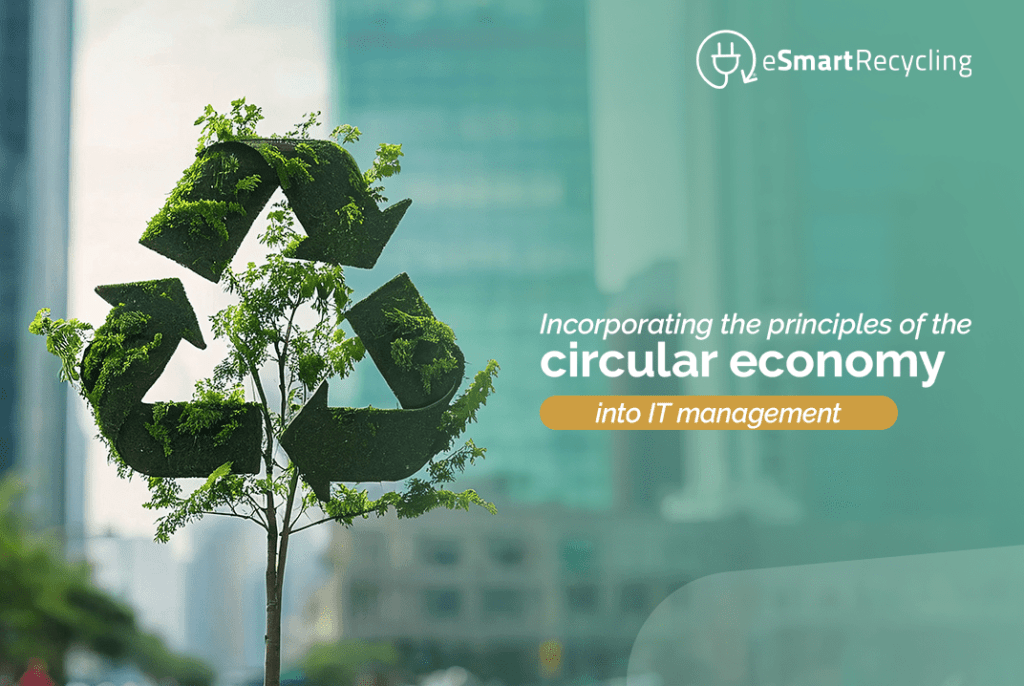
In recent years, the topic of circular economies has become increasingly important. Reducing waste or reusing products is no longer enough; now, companies are expected to adopt circular economy practices and consume resources more sustainably.
The IT sector is no exception to these changes because new regulations push them to be more environmentally conscious. Adopting circular economy principles can lead to significant cost savings and business opportunities. This article will provide a good starting point for any IT manager wishing to incorporate the principles of the circular economy into their strategy.
A circular economy refers to an industrial or economic system that aims to eliminate waste and pollution while promoting the efficient use of resources by keeping them in use as long as possible. In other words, it’s an alternative to the traditional linear economy model, where products are consumed and disposed of as waste. In a circular economy, products are designed to last as long as possible. Once they reach the end of their useful life, their components can be reused, repaired, recycled, and biodegraded.
To transition from a linear to a circular economy, companies and individuals must find creative solutions to avoid waste and promote resource efficiency. This means rethinking what products are made of, how they are manufactured, and even how they are used.
One of the central promises of the circular economy principle is to decouple economic growth from resource use and environmental impact. This makes it a particularly important issue for the IT sector, which is known for producing significant waste and consuming many resources.
However, the IT sector is also uniquely positioned to apply the principles of the circular economy due to its rapid pace of innovation and potential for digitization. In recent years, many IT companies have been working on developing more sustainable products and services while incorporating resource efficiency into their operations.
Tips for IT Managers to Adopt Circular Economy Principles
Adopting the principles of the circular economy is not as complicated. Here are some tips to help any IT manager get started:
First, all IT managers who wish to adopt the principles of the circular economy in their strategy should define clear objectives and goals. These objectives should be realistic and consider the company’s culture, unique resources, and capabilities.
Many technologies can help IT companies on their path to the circular economy. These include software applications that help monitor energy consumption and tools to design energy-efficient products and services. The key is to choose technologies that align with the company’s goals and stay aware of future technological advancements that could enable circular economy objectives.
One of the biggest challenges when adopting circular economy strategies is getting the whole organization on board. While it might be tempting to push change from the top down, the reality is that it will only be successful if the entire team is involved in the process. This means communicating the benefits of circular economy principles, choosing technologies that facilitate compliance with new standards, and providing training to help employees catch up.
Companies need to work with their suppliers to ensure that the product chain is as sustainable as possible to have a real impact on environmental sustainability. This means engaging with suppliers to help them adopt circular economy practices and choosing transparent suppliers about their sustainability goals.
Transitioning to a circular economy also requires companies to reconsider their business models. This could include offering more services, renting products to consumers instead of selling them, or setting up reverse logistics processes to ensure products are returned at the end of their life cycle.
The time has come for IT companies to transition from the traditional linear economy model to a more sustainable circular economy model. While it may seem daunting at first, by setting clear goals, using the right technologies, involving employees in the strategy, collaborating with suppliers, and keeping an open mind about new business models, any IT manager can start to make a real difference in their company’s environmental impact.
Fill out the form below to request your electronics recycling pickup.
We’ll coordinate the schedule logistics and follow up with next steps.
Recycling old laptops without risking your data is possible, but only when the process is handled correctly. For businesses, outdated laptops often contain years of emails, credentials, internal files, and access to cloud systems. Even when devices are no longer in use, the information stored on them can still be recovered if they are handled improperly.
The key is understanding what needs to happen before a laptop leaves your control and choosing a recycling path that addresses data responsibility from start to finish.
Many businesses assume that deleting files or performing a factory reset is enough before recycling a laptop. In reality, those steps often leave recoverable information behind. Storage devices can retain data fragments, user profiles, and system records that are not visible to the average user.
For companies managing employee devices, this becomes a serious concern. Laptops may include personal data, client information, financial records, or credentials that grant access to internal systems. Once a device leaves the office without proper handling, the company remains responsible for what happens to that data.
This is why recycling laptops should never be treated as a basic disposal task.
Before a laptop can move into any recycling stream, its data must be addressed in a controlled way. This step determines whether the device can be reused or must be dismantled.
Responsible recycling starts with identifying storage components and deciding how they will be handled. In some cases, data can be permanently removed so the laptop can be reused. In others, storage devices need to be physically destroyed to eliminate recovery risk.
What matters most for businesses is having certainty that data cannot be accessed again and that the process is documented.
At eSmart Recycling, we work specifically with old and outdated laptops from businesses, offices, and organizations. We receive devices that are no longer in use, assess their condition, and determine the safest path forward for each one.
We handle laptops that can still be reused as well as those that are no longer functional. In both cases, data is addressed before anything else happens. Laptops do not move forward in the process until storage components are handled under controlled conditions and recorded.
Our goal is simple. Old laptops leave our facility without data and without unanswered questions for the company that trusted us with them.
Not every old laptop needs to be destroyed. Many devices can be reused if they are still functional and meet certain criteria. Reuse can include internal redeployment, resale through approved channels, or donation through structured programs.
However, reuse only works when data has been fully addressed first. Without proper controls, reuse becomes a liability rather than a benefit.
The Environmental Protection Agency encourages the reuse of electronics when devices are handled responsibly and data risks are managed correctly.
For businesses, reuse should always be paired with records that confirm how data was handled before the laptop changed hands.
Older or damaged laptops are often not suitable for reuse. In these cases, devices are dismantled so materials can be recovered.
During dismantling, laptops are separated into components such as metals, plastics, batteries, and circuit boards. Storage devices are removed and handled separately to ensure data risks are eliminated. Materials are then sent to specialized processors that handle them according to environmental and safety requirements.
This stage requires oversight. Without tracking and downstream controls, laptops can end up in informal channels that expose businesses to unnecessary risk.
Not all recycling services follow the same rules. Certification plays a key role in determining how laptops and their data are handled.
R2v3 is one of the most widely recognized standards in the electronics recycling industry in the United States. It is managed by Sustainable Electronics Recycling International and defines requirements for data handling, environmental practices, worker safety, and downstream accountability.
Under R2v3-certified operations, recyclers must document how devices are processed and where materials are sent. These requirements are reviewed through independent audits.
We operate under R2v3 certification because businesses need confirmation that old laptops are recycled under verified processes, not assumptions.
https://sustainableelectronics.org/r2v3/
A secure laptop recycling process does not end when devices are collected. Businesses should expect documentation that supports what was done.
This includes inventory records, confirmation that data was addressed, and reports showing whether laptops were reused or dismantled. These documents support internal audits, compliance reviews, and sustainability reporting.
Without this information, recycling becomes a blind spot.
We work with businesses that want old laptops removed responsibly and permanently. At eSmart Recycling, we recycle outdated laptops under controlled, R2v3-certified processes and provide documentation that closes the loop.
For companies, recycling laptops should reduce risk, not create new concerns. Devices are handled properly, data is addressed before anything else, and records are delivered at the end. That clarity is why many organizations trust us to recycle their old laptops safely.
Companies in Florida have several options when it comes to recycling electronic equipment. However, not all options offer the same level of control, documentation, or assurance once devices leave the office. For businesses, the real challenge is not finding an option but choosing one that fully aligns with their responsibilities around data, compliance, and accountability.
Understanding how these options differ helps companies make informed decisions and avoid risks that often appear after electronics are already out of sight.
One of the most reliable options for companies in Florida is working with a certified electronics recycling provider that specializes in commercial equipment. These providers handle office electronics such as computers, servers, networking devices, printers, and accessories through structured processes.
Certified recyclers operate under defined standards that govern how equipment is received, processed, and documented. This option is commonly chosen by businesses that require traceability and clear records for internal or external reviews.
At eSmart Recycling, we work with companies that need this level of structure. Devices are inventoried, processed under controlled conditions, and supported by documentation that closes the loop properly.
Some companies prefer on-site recycling services, especially when handling large volumes of equipment or devices tied to sensitive operations. With this option, certain steps, such as inventory verification or physical destruction of storage components, are performed at the company’s location.
On-site services provide added visibility and reduce handling risks during transportation. They are often used by organizations with strict internal policies or heightened data concerns.
While not required for every project, on-site services can be a practical option when companies need direct oversight during the early stages of the process.
Another common option for Florida businesses is scheduled pickup followed by centralized processing at the recycler’s facility. This approach is well-suited for companies with routine equipment refresh cycles or multiple office locations.
After pickup, electronics are transported securely and processed at facilities designed for sorting, testing, dismantling, and material recovery. When managed properly, this option balances convenience with accountability.
The key factor is what happens after processing. Without reporting and downstream transparency, businesses lose visibility into the final destination of their equipment.
Some manufacturers and IT vendors offer take-back programs for their products. These programs usually apply to specific brands or device models and may require advanced coordination.
While take-back programs can be useful in limited cases, they often provide minimal insight into how electronics are handled after return. Documentation related to data handling or material recovery may also be limited.
For this reason, many companies treat take-back programs as a partial solution rather than a complete recycling strategy.
Donation is another option available to companies in Florida, particularly for equipment that still functions and meets reuse criteria. Donated electronics can support schools, nonprofits, or community initiatives when handled responsibly.
Before donation, devices must be evaluated, and data must be fully addressed. Without proper controls, donations can expose businesses to data risks and compliance issues.
The Environmental Protection Agency encourages reuse and donation when electronics are handled safely and responsibly.
For companies, donation works best when paired with a recycling partner that manages data handling and provides documentation.
Not all electronics are suitable for reuse or donation. Older or damaged equipment is typically dismantled so materials can be recovered.
During this process, devices are separated into metals, plastics, circuit boards, and other components. These materials are sent to specialized processors that handle them under environmental and safety regulations.
Where materials go depends on how well downstream partners are managed. This is one of the areas where standards and audits play a critical role.
One of the clearest ways to evaluate recycling options is through certification. The R2v3 standard, managed by Sustainable Electronics Recycling International, defines how electronics, data, and materials must be handled.
R2v3-certified recyclers are required to document processes, track downstream vendors, and undergo independent audits. This provides businesses with verification rather than assumptions.
We operate under R2v3 certification because it gives companies confidence that their electronics are handled properly from start to finish.
https://sustainableelectronics.org/r2v3/
Many companies in Florida explore several electronics recycling options before deciding. Pickup services, donation programs, take-back options, and certified recyclers may all appear viable at first glance.
What usually drives the final decision is visibility. Businesses want to know what happens to their electronics, how data is handled, and what documentation they will receive. When those answers are unclear, the option quickly loses value.
This is why many companies move away from fragmented solutions and look for a single partner that can manage the entire process with accountability.
At eSmart Recycling, we work with companies that want one clear electronics recycling solution in Florida. We manage the full process, from inventory and data handling to processing and final reporting, under R2v3-certified operations.
Rather than offering partial services, we provide a structured path. Companies know where their electronics go, how they are handled, and receive documentation that supports audits, compliance reviews, and internal reporting.
For businesses in Florida, choosing eSmart Recycling means removing uncertainty from electronics recycling. Devices are handled responsibly, data risks are addressed properly, and the process closes with clear records. That consistency is why many companies see us not just as a recycler, but as their long-term electronics recycling partner.
Recycled office computers in the United States do not all share the same destination. Some are reused, others are dismantled for materials, and a portion is destroyed under controlled processes. What determines where these devices end up is not only their condition, but how the recycling process is managed from the start.
For businesses, knowing where office computers go after recycling matters. It impacts data security, regulatory compliance, and the management of technology assets once they leave the workplace.
The recycling process begins with identification and tracking. Before any technical work takes place, each computer is reviewed, logged, and associated with an inventory record. This step allows businesses to maintain visibility over devices that once stored internal data.
Responsible recyclers treat this phase as a control point. Without proper inventory, computers can move through informal channels, increasing the risk of data exposure or loss of accountability.
When we receive office computers, every unit is documented before it moves forward.
Office computers often store years of internal information. Emails, user credentials, financial files, and access tokens can remain on devices long after they stop being used.
Because of this, no computer should be reused or processed before its data is fully addressed. Storage media is handled based on device condition and reuse criteria. In some cases, data is permanently removed so the device can be reused. In others, storage components are physically destroyed.
What matters for businesses is not the technical method, but the assurance that data cannot be recovered and that the process is documented.
This step is what separates responsible recycling from basic disposal.
A portion of recycled office computers in the US is suitable for reuse. Devices that pass inspection and data handling requirements may be refurbished and returned to service through controlled channels.
Reuse can take several forms. Some computers are redeployed internally by organizations. Others enter secondary markets or structured donation programs. In all cases, reuse only happens after data has been fully addressed.
The Environmental Protection Agency confirms that reuse reduces demand for raw materials and extends the useful life of electronics.
For businesses, reuse works when downstream partners are known and properly managed.
Not every office computer qualifies for reuse. Older models, damaged units, or devices with outdated components are usually dismantled.
During dismantling, computers are separated into material categories. Metals, plastics, circuit boards, and glass are processed by specialized facilities. Valuable materials such as copper and precious metals are recovered, while hazardous substances are handled under environmental controls.
This stage is where transparency becomes critical. Without oversight, materials can be mismanaged or exported without proper safeguards.
One common question businesses ask is whether recycled computers stay in the US or are sent overseas.
Export of electronic waste is regulated and closely monitored when handled correctly. Issues arise when recycling lacks oversight or when downstream vendors are not properly vetted.
International agreements like the Basel Convention highlight the risks associated with uncontrolled electronic waste movement.
Certified recyclers are required to document downstream partners and ensure materials are processed in approved facilities, whether domestic or international.
R2v3 certification plays a central role in determining the final destination of recycled office computers. The standard is managed by Sustainable Electronics Recycling International and applies strict requirements to data handling, material processing, and downstream accountability.
Under R2v3-certified operations, recyclers must prove where equipment goes, how materials are handled, and how data risks are controlled. These requirements are verified through independent audits.
We operate under R2v3 certification because businesses need clarity, not assumptions, about what happens after recycling.
More information about the standard is available here:
https://sustainableelectronics.org/r2v3/
For businesses, the final destination of office computers should never be a mystery. Proper recycling includes documentation that supports every step of the process.
This usually includes asset inventories, confirmation of data handling, and recycling or processing reports. These records support internal audits, sustainability reporting, and compliance reviews.
We make sure that businesses receive clear documentation showing what happened to each device.
No. Reuse depends on condition, age, and handling requirements. Many devices are dismantled instead.
Properly recycled computers should not. Certified processes direct materials to approved processors.
Yes. Tracking is possible when recyclers provide downstream transparency and reporting.
Yes. Certification defines how devices are processed and where materials are allowed to go.
Where office computers end up after recycling is not a technical detail. It is a business decision that affects data responsibility, reporting, and trust. Once devices leave the office, the company is still accountable for what happens next.
Businesses that understand this do not look for the fastest exit for old equipment. They look for clarity. They want to know whether computers are reused, dismantled, or processed as materials, and they want records that support those outcomes.
Working with an R2v3-certified recycler provides that clarity. It establishes rules, traceability, and verification across the entire process. There are no assumptions, no loose ends, and no unanswered questions.
For us, recycling office computers is about closing the loop properly. Devices leave the workplace, but responsibility does not disappear with them. A clear process, backed by certification, is what ensures that old office computers end up exactly where they should.
When a business in Tampa recycles its electronic equipment, the process involves much more than clearing out storage rooms or upgrading hardware. It directly affects data security, regulatory compliance, and how responsibly the company manages its technology assets.
Recycling electronics the right way means knowing what happens to devices, how data is handled, and why working with a certified recycler matters. Below, we explain how this process works for businesses in Tampa and what companies should expect at each step.
The process usually starts with an internal review. Businesses identify computers, laptops, servers, printers, networking equipment, and accessories that are no longer in use. These devices often contain sensitive data, even if they have been powered off for years.
Once the equipment is identified, a commercial electronics recycler is contacted. In Tampa, many businesses choose recyclers that specialize in corporate electronics rather than general drop-off locations. This distinction matters because business devices require tracking, documentation, and secure handling.
When we receive equipment from a business, each item is logged and audited. Serial numbers, device types, and storage components are recorded. This inventory becomes the foundation for accountability and reporting.
Data security is one of the main concerns for businesses recycling electronics. Hard drives, solid-state drives, and embedded storage can retain sensitive information long after a device is retired.
According to the 2025 Data Breach Investigations Report published by Verizon, data exposure linked to asset mismanagement remains a recurring issue for organizations in the United States.
Recycling electronics without proper data destruction puts companies at risk of data leaks, regulatory penalties, and reputational damage.
For this reason, responsible recyclers follow recognized data destruction standards. One of the most widely accepted guidelines is NIST 800-88, issued by the National Institute of Standards and Technology.
https://csrc.nist.gov/publications/detail/sp/800-88/rev-1/final
Data is handled through either certified data wiping or physical destruction of storage media, depending on the condition and future use of the equipment.
Not all electronics recyclers operate under the same rules. R2v3, short for Responsible Recycling version 3, is one of the most rigorous standards in the electronics recycling industry.
The R2v3 standard is managed by Sustainable Electronics Recycling International and sets clear requirements for:
When a business works with an R2v3-certified recycler, it gains assurance that every step of the process is verified by independent audits.
We operate under R2v3 certification because businesses need clear proof that their electronics and data are handled correctly.
Once data destruction is completed, devices are evaluated individually. Some equipment can be refurbished and reused, while other items are dismantled for material recovery.
Reusable devices are tested and prepared according to strict criteria. Equipment that cannot be reused is broken down into components such as metals, plastics, and circuit boards.
The Environmental Protection Agency explains that responsible electronics recycling reduces environmental risks and prevents hazardous materials from entering landfills.
For businesses, this process results in clear reporting that shows how equipment was handled and where materials ended up.
Businesses in Florida and across the United States are subject to data protection and privacy regulations. Laws such as HIPAA and GLBA require organizations to manage sensitive data carefully, even when devices are retired.
Improper disposal of electronics can lead to compliance violations and legal exposure. This is why IT teams, compliance officers, and sustainability managers are often involved together in recycling decisions.
Working with a certified recycler helps companies demonstrate due diligence and meet internal and external audit requirements.
For most companies, the recycling process follows a structured flow:
Each stage is documented. This documentation is essential for internal records and future audits.
Yes. Devices can be reused if data is securely removed and the equipment passes a technical evaluation.
The business remains responsible until the recycler completes data destruction and provides official certificates.
Timelines depend on volume and device types, but most projects are completed within days after pickup.
Yes. Certificates of data destruction or recycling are a key part of compliance and recordkeeping.
We work with businesses that need clarity, security, and proper documentation. Our R2v3 certification supports every step of the process, from inventory tracking to final reporting.
When we say “we,” we mean involvement beyond equipment pickup. We stay engaged until businesses receive all required certificates and reports, knowing their data is fully removed and their electronics are handled responsibly.
Before companies recycle their electronic equipment, the questions usually come quietly. They appear in internal emails, short meetings, or last-minute conversations just before a pickup is scheduled. These questions are rarely about recycling as an idea. They are about responsibility, process, and what happens once the equipment leaves the building.
At eSmart Recycling, we hear these questions every week from companies across the U.S. They come from IT managers, operations teams, and sustainability leads who want clarity before moving forward. Understanding these concerns helps companies recycle with confidence instead of hesitation.
This is often the first question companies ask, even if it is not always said out loud. Once equipment leaves the site, there is a natural loss of visibility. Companies want to know where devices go, how they are handled, and whether the process continues in a controlled way.
A structured recycling process does not end at pickup. Equipment should move through defined internal steps that are documented and traceable. When companies ask this question, they are usually seeking reassurance that recycling is not a blind handoff, but a managed sequence with clear outcomes.
Even when devices are no longer in use, concerns around data remain. Companies often ask whether equipment still contains information and how that information is addressed during recycling.
This question is less about technical detail and more about trust in the process. Companies want to avoid uncertainty once devices leave their control. Clear procedures and internal handling standards help ensure that data-related concerns are addressed early, rather than becoming unanswered questions later.
Many organizations assume that recycling starts only when a truck arrives. In reality, companies often want to know what they should do beforehand.
This includes questions about sorting, labeling, or simply understanding which devices are included. Preparation helps avoid confusion during pickup and reduces the chance of equipment being overlooked or mishandled. When companies ask this, they are usually looking for guidance rather than extra work.
Another common question is whether laptops, desktops, servers, and peripherals follow the same path once recycled. Companies recognize that not all devices are equal and want to know how differences are handled.
Clear processes account for these variations without forcing companies to manage them internally. This question often reflects a desire for simplicity paired with accountability.
As companies become more familiar with electronics recycling, they begin asking about certifications and industry standards. This question usually comes once a company has experienced unclear or inconsistent recycling in the past.
Certifications such as R2v3 are designed to bring structure and consistency to electronics recycling. R2v3 is maintained by Sustainable Electronics Recycling International and defines requirements for handling, documentation, and downstream management of equipment.
For companies, asking about certification is a way to verify that a recycler follows documented practices rather than informal methods.
Documentation is another topic that surfaces early in conversations. Companies want to know whether they will receive confirmation once recycling is complete and what that confirmation looks like.
This question is rarely about paperwork alone. It reflects a need to close the loop internally. Documentation allows teams to confirm that equipment was handled properly and that the recycling process reached a clear endpoint.
Some companies worry that recycling will interrupt daily work or require special coordination. They ask whether pickups can be scheduled smoothly and whether the process adapts to their timelines.
These questions often come from teams that have experienced rushed cleanouts or last-minute recycling efforts. Companies are looking for a process that works alongside normal operations rather than disrupting them.
Organizations often accumulate electronics over time. When they finally decide to recycle, they may have equipment from different years, departments, or uses.
Companies ask whether this creates complications. In most cases, the concern is about whether older or mixed equipment can still be handled in an orderly way. Clear intake processes help avoid confusion and keep recycling manageable, even when inventories are not perfectly organized.
Once companies begin asking questions, they often start thinking beyond the current recycling cycle. They want to know how to prevent electronics from piling up again.
This question signals a shift from reactive cleanouts to ongoing management. Companies begin to see recycling as part of regular asset lifecycle handling rather than an occasional task.
The questions companies ask before recycling are not obstacles. They are indicators of responsibility. They show that organizations want to understand what they are participating in and how their decisions carry forward.
When these questions go unanswered, recycling becomes uncertain. When they are addressed clearly, companies move forward with confidence and consistency.
At eSmart Recycling, our role is to answer these questions before they turn into concerns. We work with companies to explain each step of the recycling process in plain terms, from preparation to completion.
As an R2v3-certified recycler, we follow defined procedures that help companies maintain clarity throughout the recycling process. This allows organizations to recycle equipment knowing what happens before, during, and after pickup.
Over time, these conversations help companies shift from one-time recycling events to steady, repeatable practices.
Companies rarely hesitate to recycle because they do not care. They hesitate because they want to understand what they are handing off.
Asking questions before recycling is not a delay. It is part of responsible decision-making. With clear answers and structured processes, recycling becomes less of a concern and more of a normal operational step.
From eSmart Recycling, we see these questions as the starting point of better electronics management, not the end of the conversation.
Most companies do not mishandle old electronics on purpose. The issues usually come from habits that develop quietly over time. Equipment is replaced, stored “for later,” and gradually forgotten. What begins as a temporary solution often turns into a long-term gap in responsibility.
From eSmart Recycling, we see the same patterns across offices, schools, and organizations of all sizes. These mistakes are common, rarely intentional, and easy to overlook until they start causing operational friction.
One of the most frequent mistakes is assuming that storage equals resolution. Old desktops, laptops, servers, and networking equipment are placed in closets or storage rooms with the idea that they will be addressed eventually.
Over time, that moment never arrives. Equipment stays listed as assets without a clear plan, space fills up, and responsibility becomes diffuse. Storage does not solve anything on its own. It only postpones decisions that still need to be made.
Another common issue appears when equipment moves internally. Devices are reassigned, returned from employees, or relocated between offices. When they come back, they are often placed in storage without proper tracking.
As time passes, it becomes difficult to answer basic questions about that equipment. Accountability fades, and with it, the ability to manage those devices in a structured way. This loss of clarity usually becomes visible only when a company finally decides to clean out accumulated electronics.
Age is often mistaken for irrelevance. Many companies believe that if equipment is outdated, it no longer requires careful handling.
In practice, older devices still represent company assets and still fall under internal policies, operational standards, or reporting requirements. Treating old electronics as harmless clutter is one of the reasons companies end up with unresolved risks and repeated cleanout cycles.
When space becomes tight, some companies look for quick ways to remove equipment. Informal disposal options may seem convenient, but they often lack structure, oversight, and documentation.
Once electronics leave a company without clear records, there is no way to verify what happened afterward. From an operational standpoint, this creates gaps that cannot be closed retroactively.
Another recurring mistake is reducing electronics recycling to a single event. The objective becomes getting equipment out of the building as quickly as possible.
When removal is treated as the entire process, critical steps are overlooked. Planning, custody transfer, handling after pickup, and closure are seen as secondary. Over time, this approach leads to inconsistency and repeated corrective efforts.
Recycling works best when it is part of end-of-life asset management, not an emergency response.
Many companies stop paying attention once equipment leaves their site. This is one of the most significant blind spots in electronics management.
What happens after pickup determines whether a service is structured or superficial. Equipment should move through controlled internal processes, with clear handling and defined outcomes. Without visibility into this stage, companies are left assuming everything was handled correctly.
Standards such as R2v3, developed by Sustainable Electronics Recycling International, exist to bring structure to this part of the process.
They define how the chain of custody, downstream handling, and records should be maintained once equipment leaves the client’s control.
Documentation is often requested only when someone asks for it. Many companies recycle electronics without requiring records upfront, assuming they can retrieve them later.
In reality, documentation is most effective when it is created as part of the process itself. Pickup records, processing confirmations, and completion documentation allow companies to close the loop properly.
Without documentation, recycling remains an unresolved action rather than a completed one.
Another common pattern is handling electronics only during major cleanouts. Equipment accumulates for years and is then removed all at once.
This approach increases pressure, reduces oversight, and often forces rushed decisions. Smaller, regular recycling cycles help companies maintain control and avoid repeating the same mistakes.
Companies that correct these patterns usually start by choosing a partner that brings structure and consistency to the process. Clear standards, defined workflows, and predictable communication replace uncertainty.
As an R2v3-certified recycler, we work with organizations to manage electronics through documented steps, from planning to completion. This helps companies move away from reactive cleanouts and toward steady, controlled management of retired equipment.
Over time, recycling becomes part of normal operations instead of a recurring issue.
A common question is whether older equipment really needs the same level of attention as newer devices. Consistent handling often simplifies management and avoids exceptions.
Another question is whether past mistakes can be corrected. In most cases, they can. Bringing structure into future processes helps stabilize electronics management going forward.
Companies also ask how to avoid repeating the same issues. Regular review, clear standards, and working with qualified recyclers are usually where progress begins.
Old electronics rarely become a problem overnight. They become a problem when they are ignored.
Companies that address these common mistakes gain clarity, free up space, and reduce uncertainty. Electronics recycling shifts from a periodic scramble to a controlled, repeatable process.
From eSmart Recycling, our role is to help companies recognize these patterns early and manage retired electronics with consistency and care.







Did you enjoy our latest blog articles just above?
Subscribe to receive new stories, insights, and impact updates straight to your inbox.
We’ll send you curated content about our partners, recycling strategies, success stories, and how your involvement is driving change through technology access and digital empowerment.
💡 No spam, just the smart stuff.